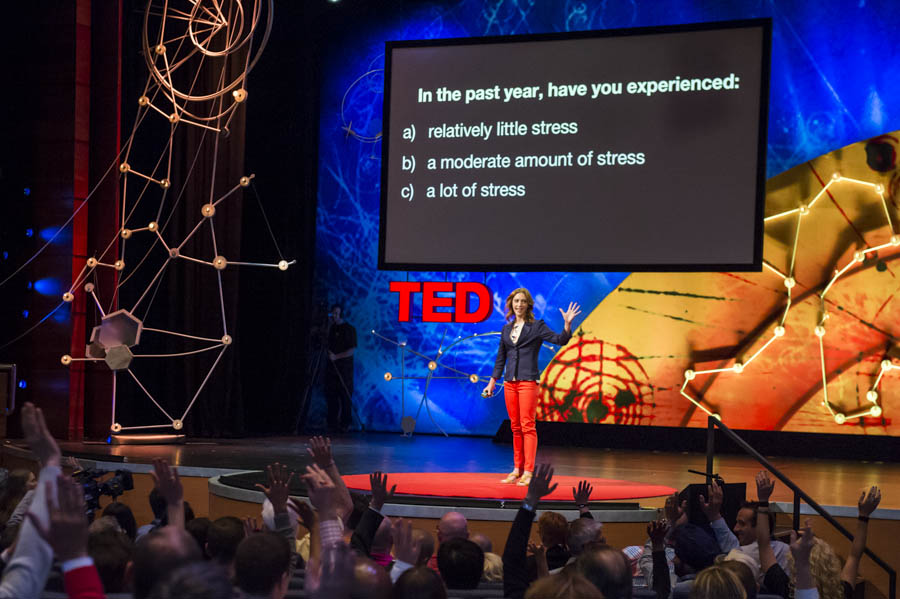Health psychologist Kelly McGonigal is here to talk about stress. In particular, she’s here to make the case that stress might not, in fact, be the enemy we tend to think it is. To do this, she asks those assembled in the conference hall in Edinburgh to indicate how much stress they’ve felt in the past year. Surprise surprise, the majority of the audience confesses they have suffered a good deal. Poor stressed lambs at TEDGlobal!
But now, a confession. “My fear is that something I’ve been teaching for the past ten years has been doing more harm than good,” says McGonigal. “Basically, I’ve turned stress into the enemy. But I’ve changed my mind about stress, and today I want to change yours.”
She cites the 2012 study that made her rethink her whole approach, “Does the perception that stress affects health matter?” by scientists from the University of Wisconsin-Madison. It turns out that thinking that stress is bad for you is … really bad for you. Incredibly, she says, over the eight years of the survey, 182,000 people died prematurely from the belief that stress was bad for them. She extrapolates for us: If that estimate is correct, then believing this is so would have been the 15th largest cause of death in the United States.
“You can see why this study freaked me out,” she adds wryly.
McGonigal cites another 2012 paper, “Improving Acute Stress Responses: The Power of Reappraisal,” published by scientists at Harvard’s department of psychology, and asks what might happen if we change the way we think about stress. “What if we thought about it as helpful?” she asks. Turns out, treating common stress responses as a positive might even be literally good for the heart. Why not recast the stress response as your body responding usefully to a challenge?
McGonigal also wants to talk about oxytocin, the much-hyped (and maligned) neuro-hormone that she describes as finetuning the brain’s social instincts. Amidst all the hype about the “cuddle hormone” and the much-ridiculed notion that we should snort it to become happier people, one fact we lose track of, she says, is that oxytocin is actually a stress hormone.
And she has one last study to show us, “Giving to Others and the Association Between Stress and Mortality.” This found that spending time socializing and caring for others can also create stress-related resilience.
“The harmful effects of stress on health are not inevitable,” McGonigal says. “How you think and how you act can transform your experience of stress. When you choose to view your stress response as helpful, you create the biology of courage. And when you choose to connect with others under stress, you can create resilience.”
So while she obviously wouldn’t ask for more stressful experiences in her own life, she does have a new appreciation of the condition. “When you choose to view stress in this way, you’re not just getting better at stress, you’re actually making a pretty profound statement,” she concludes. “You can trust yourself to handle life’s challenges. And you’re remembering you don’t have to face them alone.”
Kelly McGonigal’s talk is now available for viewing. Watch it on TED.com »


Comments (32)
Pingback: Most Popular Interviews of 2013 | Enjoying The Moment
Pingback: KeepingScore | It is possible to think yourself well
Pingback: TED Talks | Mentor Me
Pingback: Mind over Body - Gregg Hake's Blog
Pingback: How To Make Stress Your Friend | 101.9 KINK FM - True to the Music
Pingback: Dont get cought in the eddy | orderfromthechaos
Pingback: It getting colder, which means more snuggling and ...better heart health!
Pingback: Re-Perceive Stress to Lower Risk of Disease and Death
Pingback: It’s All About the Attitude | a2barrebeefit
Pingback: TEDGlobal – Inspiration overload! ‹ Alfa Bravo
Pingback: MN Rural Round-Up: July 2013 | Minnesota Rural Partners
Pingback: I got to keep on movin'... - Root To Rise
Pingback: I’m Kelly McGonigal, and This Is How I Work | Welcome to My World!
Pingback: I’m Kelly McGonigal, And This Is How I Work | Lifehacker Australia
Pingback: I’m Kelly McGonigal, and This Is How we Work « Music RSS
Pingback: I’m Kelly McGonigal, and This Is How I Work « Music RSS
Pingback: I’m Kelly McGonigal, and This Is How I Work | Binary Reveux
Pingback: I'm Kelly McGonigal, and This Is How I Work | Daily IT News on IT BlogIT Blog
Pingback: I’m Kelly McGonigal, and This Is How I Work | Blog of MPRosa